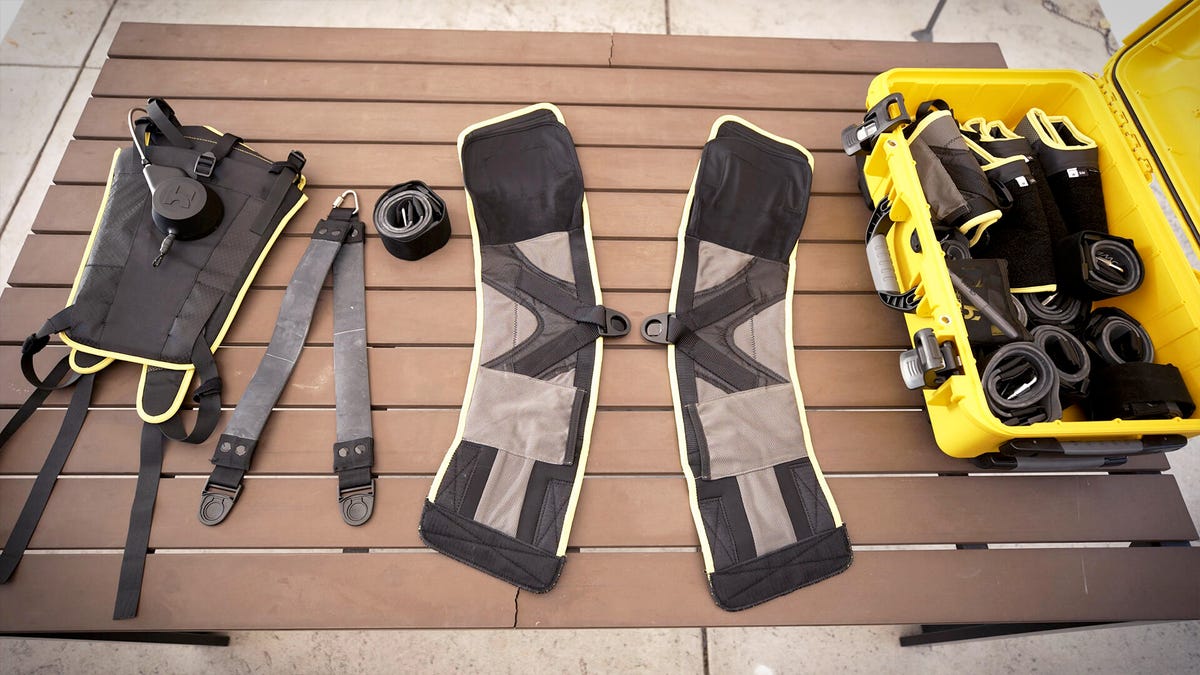The HeroWear Apex exosuit has your back
This lightweight exoskeleton promises to ease strain on your back. They sent us a suit to try it out.

A HeroWear Apex fit kit includes sleeves and bands in various sizes to fit a wide range of body sizes and types.
Workplace exoskeletons aren't a new concept. Companies have been testing wearable devices to prevent workplace injuries for years. Most suits are heavy and equipped with expensive electronics. That's where Nashville startup HeroWear is trying to set itself apart with its Apex exosuit.
Apex doesn't look like a suit Tony Stark would wear. It's more like a backpack, with straps that sit on either shoulder, plus thigh sleeves and bands that can all be swapped out to customize the fit. "I started thinking, 'Hey, is it possible to develop a device that assists like these rigid exoskeletons, but can be much more practical, that can be more like clothing?" co-founder Karl Zelik told CNET. To see our hands-on with the Apex, click the video below.
Exoskeletons are wearable devices that can enhance strength and help prevent injury. Some can also be used to help those with spinal injuries walk again. Carmakers like Fiat Chrysler and Ford have tested exoskeletons from manufacturers like SuitX and EksoVest to help employees lift car components. But the benefits of wearing an exoskeleton may extend beyond manufacturing to many different jobs, such as agriculture or health care. According to one survey from Statista, 26% of US adults who suffer back pain blame it on physical work.
The Apex uses a proprietary mechanism that sits in a band around the back of the wearer, who can activate the suit's assistance when it's needed. HeroWear says its exosuit will take 50 pounds (23 kilograms) of strain off your back each time you lift an object. For leaning and lifting tasks, it can reduce muscle activity in the lower back anywhere from 15% to 45%, the company says.
Unlike many other exoskeletons that have heavy metal parts and can weigh up to 150 pounds, the HeroWear is light. It weighs just 3.4 pounds (1.6 kilograms) and is made of a variety of fabrics, including nylon, lycra and mesh. The exosuit is also designed to be more incognito, as it can be worn under clothing if desired. There's a female fit version that's designed specifically to suit a woman's body.
Apex is also passive, so there are no batteries that need to be swapped in or out and it doesn't require charging. You just turn on the assistive mode with a switch. The trade-off is you won't be able to lift crazy amounts of weight with minimal effort. The Guardian XO powered exoskeleton from Sarcos Robotics can help you lift up to 200 pounds (91 kilograms) with ease, but with this one, HeroWear recommends you don't go nuts: It's not designed to help you lift heavier loads than you normally would.
The HeroWear Apex costs $1,199 (£965, AU$1,957) and is expected to be available in limited quantities starting this summer. For the time being, it's aimed mostly toward the logistics industry, though the company says it's had interest from several other areas, including construction and the military.

